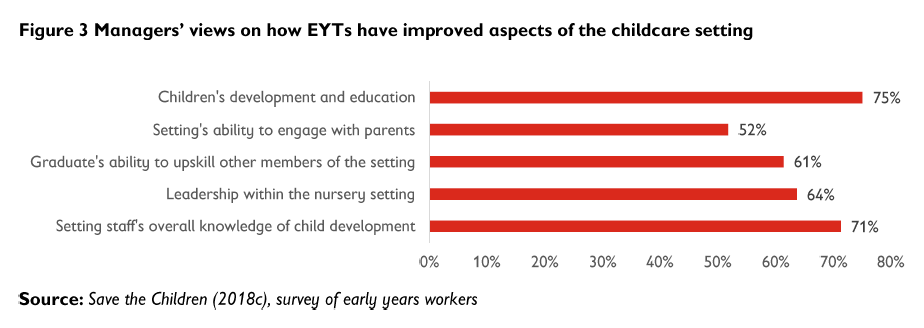Fears of 'childcare staffing crisis' amid steep drop in trainee early years teachers
Joe Lepper
Friday, November 30, 2018
The number of people training to be an early years teacher has fallen by more than a third in the space of 12 months, government figures have revealed.

Teacher training figures published by the Department for Education show there were 365 new entrants to an early years teacher training course in the 2018/2019 academic year.
This is 185 fewer than in 2017/18, when 550 students enrolled - a fall of 33.6 per cent. Numbers of early years teaching trainees have been falling steadily in recent years. In 2016/17, 620 students enrolled. Since 2013/14 the number of enrolments is down 84 per cent, according to analysis by Save the Children.
At the current rate of decline, the charity calculates that by 2023, 80 per cent of childcare staff will either not have or will not be working towards a higher level qualification.
Save the Children has described the decline as a "childcare staffing crisis" because the high-quality childcare they offer is crucial to helping bridge the attainment and development gap between disadvantaged children and their peers.
In its report It All Starts Here, Save the Children estimates that there are 11,000 nurseries, including 2,000 in disadvantaged areas, across England that do not employ an early years teacher.
In total, 325,000 children in England attend an early years setting without a graduate teacher. The areas with the lowest proportion of graduate staff are the East Midlands and the East of England, where 31 per cent of settings employ an early years teacher or equivalent.
The council area with the lowest proportion is Swindon, at just eight per cent. London has the highest proportion, at 43 per cent. The number of courses on offer has also dropped, from 43 in 2016 to 30 in November this year.
The report also includes a survey of teachers, early years managers, course leaders and academics. This reveals that 75 per cent of managers found employing a graduate helped children's development and education and 71 per cent said it helped boost wider staff knowledge of child development.

However, poor pay was cited as a key barrier to recruitment and was driving teachers out of the profession. Staff, providers, and trainers told the charity that there was often little difference in pay between early years teachers and those without the status.
One early years teacher who left the UK in search of better pay and conditions told researchers: "My pay while studying was barely minimum wage and I was cramming in extra hours to make up for my study day. Then after I qualified my pay was just a bit more. No thanks."
Despite poor pay for many early years teachers, high cost is seen as the biggest barrier among providers to not employing a graduate, cited by 79 per cent of those in settings without the role.
Save the Children has called on government to trial financial incentives for early years teachers to work in disadvantage areas. It also wants funding top-ups for providers in disadvantaged areas that employ early years graduates to be tested. Save the Children also wants better promotion of existing funding and support to settings and early years teachers.
The government, course leaders and the early years sector should also come together to create a clearer job description of early years teachers.
"This steep decline in early years teacher trainees represents a crisis in the childcare workforce, said Steven McIntosh, Save the Children's director of UK policy, advocacy and campaigns.
"Highly qualified early years teachers play a crucial role in helping children catch up, and are especially needed now with recent figures showing that poorer children are still so much more likely to fall behind by the time they start primary school.
"The government's commitment to close this early learning gap is welcome, but it is failing to invest in what we know works - a highly qualified childcare workforce. Unless the government gets to grips with this staffing crisis, a generation of children are at risk of being left behind."
Stella Ziolkowski, director of quality and training at the National Day Nurseries Association said: "Government must look at the detrimental impact that the depletion of qualified staff in the sector will cause and put measures in place to address this. Unless they act now, the inequality gap will grow even wider."
Liz Bayram, chief executive of the Professional Association for Childcare and Early Years, said: "Without improved wages and career progression, we won't have the early years teachers the sector needs to support high-quality early education, especially for our most disadvantaged children.
"This is a dire situation that could be easily remedied through sustainable funding, so settings can pay early years teachers' wages that are comparable to their primary teacher colleagues."




